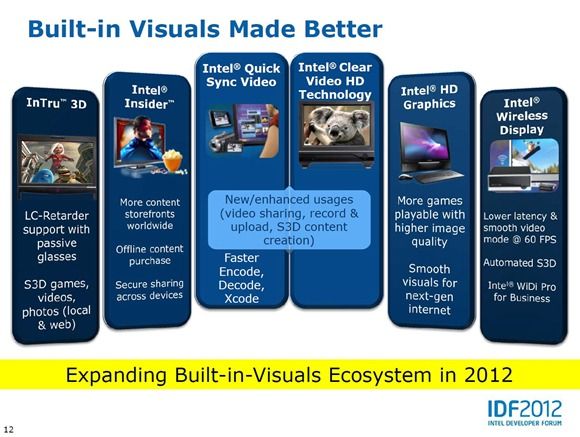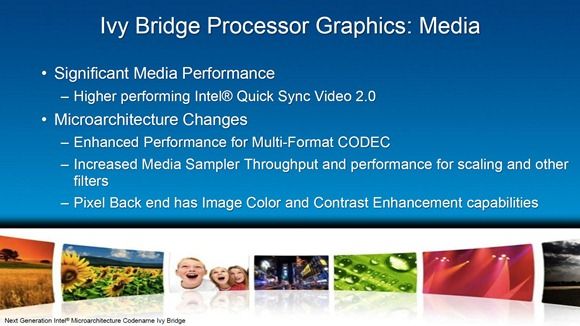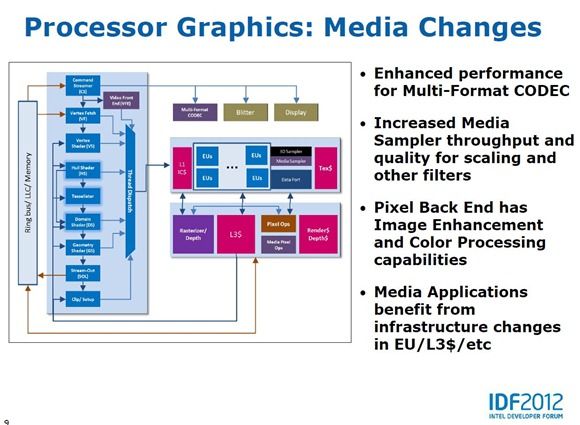A lot has been said about Ivy Bridge, the 3rd generation Intel Core compute platform and the platform that will go into the 2nd Generation of Ultrabooks. Although the CPU core remains largely the same as in the ‘Sandy Bridge’ platform, it’s going to be manufactured with the next generation process at 22nm. That means lower power usage and more space for other goodness on the die and that’s exactly what Intel have done. They’ve taken the opportunity to vastly improve the graphics and media subsystem. You’ll hear about ‘70%’ improvements on the GPU which relates to gaming graphics. Early tests have shown that where modern game frame-rates were in the 10-20fps range, they may now reach above the all-important 30fps figure and include DirectX11 support which brings the Ultrabook right into mainstream gaming. In this article though I want to talk about the other features on the GPU that relate to media. For many people they may be more important than 3D gaming frame rates.
First, lets run through the various versions of the Ivy Bridge CPU that we’re expecting to be formally launched for Ultrabooks in the next few weeks. remember that most of these CPUs have a ‘configurable’ TDP which can be set to ‘down’ or ‘up’ and will thus cap the TDP at a lower or higher TDP. We can only assume that it affects the way Turbo boost is managed.
CPU/GPU line-Up
(Details so far)
Core i7
3667U 2.0-3.32Ghz (at nominal TDP of 17W) GPU clock 350Mhz-1150Mhz
3517U 1.9-3.0Ghz (at nominal TDP of 17W) GPU clock 350Mhz-1150Mhz
Core i5
3427U 1.8Ghz-2.8Ghz (at nominal TDP of 17W) GPU clock 350Mhz-1150Mhz
3317U 1.7Ghz-2.6Gz (at nominal TDP of 17W) GPU clock 350Mhz-1050Mhz
Core i3
3217U 1.8Ghz (at nominal 17W TDP) GPU clock 350Mhz-1050Mhz
All Ivy Bridge platforms for Ultrabooks are expected to have HD 4000 graphics units with 16 execution units. 1st-generation Ultrabooks used the HD 3000 CPU with 12 execution units. (Execution units affect the performance of both 3D and video processing performance.)
HD 4000 architecture
Here’s around-up of the new and improved media features in HD 4000
- Direct X 11 support now on-board. (HD 3000 was Direct X 10.1)
- Open GL 4.0 support built-in (HD 3000 was Open GL 3.1)
- Open CL 1.1 (HD 3000 had no Open CL hardware support)
- 3 Display support. We’ve already seen a demo where the Ultrabook screen and two external screens were driven via two on-board video ports.
- Intel Quick-Sync Video now with improved Encode and Decode support. For example, the decoder can decode 400 frames per second of 25mbps 1080p.
- Multi Format Codec (MFX) Engine (part of the Intel Quick-Sync Video architecture) supports up to 4096×4096 processing including playback of multiple 4K streams and low-latency processing for video conferencing.
- Intel Media SDK enhanced to support new features of Ivy Bridge.
- Improved post-processing of video output (Clear Video HD Technology.)
- Intel Wi-Di support increased to 60fps at 1080p. Remember that Wi-Di is not a lossless transport layer.
- HDMI 1.4a, including high-bit-rate audio. HDMI 1.4 also supports an audio return channel, ethernet channel and 3D over HDMI. We can’t confirm if these features are supported in the HD 4000.
What it means for the customer.
There’s a lot here for video editors and improvements in codecs may actually move HD 4000 towards to the high-end of the mainstream in terms of speed and quality. The experts are really only starting to test HD 4000 at the moment and I’m sure there will be some people that find issues but home video producers are certainly going to appreciate the speed improvements. Expect Cyberlink and ArcSoft to release updates for their media suite to support Ivy Bridge very soon. Given that we already use Cyberlink PowerDirector for 1080p source material, we’re quite excited to see what sort of encoding improvements can be expected. Current estimates and early tests range up to about 50% improvement. In this Cyberlink Media Espresso 6.5 test, the HD 4000 cut 30% off the time it took to convert the sample file.
Three-screen working is a huge advantage over HD 3000. For the first time on an Ultrabook you’ll be able to run a couple of external 1080p screens which really brings the Ultrabook (and other laptops based on Ivy Bridge, of course!) to the desktop. 4K output will also be an interesting ‘tease’ for some people.
As applications start to optimise the use of Open CL there could be some advantages for those that spend a lot of time in browsers. Speed advantages are obvious but there’s potential for power saving.
Finally there’s 3D support which, combines with the ‘Intel Insider’ secure video delivery path, could make for some interesting home theater experiences. Get those 4K screens ready.
The outstanding question is, will AMDs Trinity blow HD 4000 out of the water? In 3D gaming performance, there’s a good chance it will. For video encoding, Quick Sync is likely to be a lot faster. As for overall image quality, it’s too early to tell.
The first Ivy Bridge-based Ultrabooks are expected to be available in Mid June 2012. [Here’s our timeline prediction]














Can’t wait AMD’s turn :)
Hope that you are not financed by Intel and can’t talk about AMD :D
We’re also excited about ultrathins and will be covering that segment.
Just to be clear and open – The site is not sponsored by Intel but Intel have reached out to me (Chippy) on a number of occasions to offer information and sponsorship for events. I’m in touch with the AMD and ARM guys too though!
great then :)
good job!
Too bad the Cyberlink and ArcSoft products don’t have very many features beyond putting stuff on YouTube. Does the hardware encoder/decoder support 10-bit H.264 or just 8-bit like before?
Nevermind about my question. According to AnandTech: http://www.anandtech.com/show/5773/intels-ivy-bridge-an-htpc-perspective/8 , Ivy Bridge doesn’t support 10-bit encoding/decoding.
Try Freemake.
Its free, it uses hard ware acceleration in Intel chips as well as Nvidia’s CUDA.
It encodes just about anything and has a nice automatic Youtube function as well.
All without gunking up your computer with rootkit like copy protection crap as Cyberlink does… I’ve gotten sick of Cyberlink and removed all their shit from my computer.
Handbrake is nice, but no hardware accel as far as I can tell.
I got Cyberlink products in a package with an LG Blu-Ray drive.
It refused to install, saying it would only install on a system that had that LG Blu-Ray drive installed, even though the install disk was running from that very drive it demanded to see.
After numerous hassles trying to connect with LG support, one of which was the model number flagged as invalid, even though I had to select it from LG’s drop down list(!) The LG rep explained to me what was missing in the manual:
You have to uninstall any other optical drive from your computer. You also have to uninstall any virtual drive software from your computer. The LG drive must have the drive letter ‘D’ assigned to it, otherwise the Cyberlink installation fails.
Once I got the Cyberlink install to run, it installed a boatload of copy protection stuff, always running license server, phone home service and some other thing I forget now.
Then I started to get windows resource error problems (error 1450) on various other operation unrelated to Cyberlink, like file copy or running computer games.
After dumping Cyberlink and making sure everything was cleared off, the errors stopped and my system works again.
Nice company, huh?